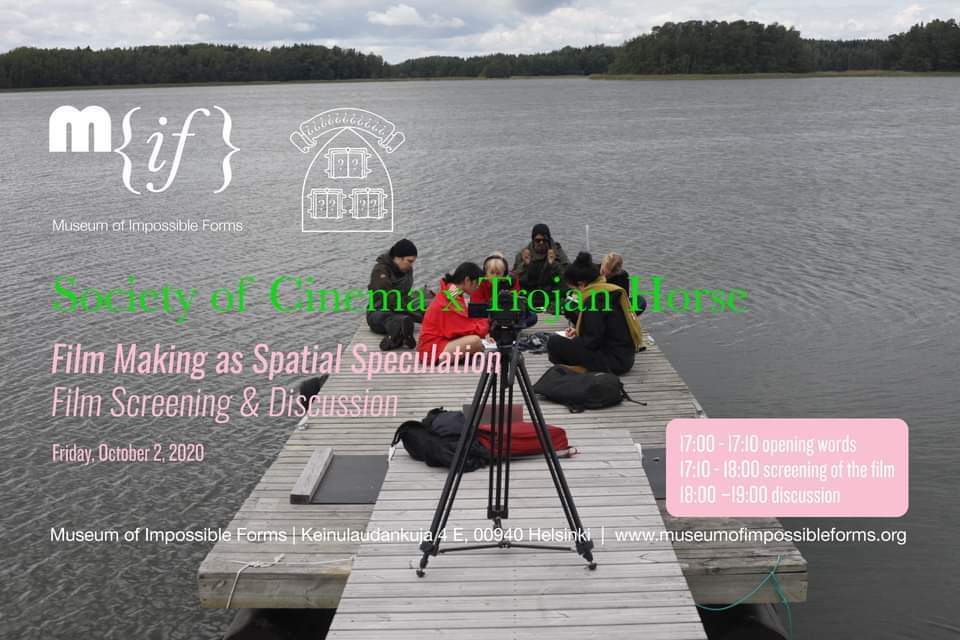 In this picture we are making direct spatial translations of our environment and a text of Tomas' environment. Tomas is a system impacted artist based in the USA. We transcended borders with our translations as we had participants located in the USA, India and Finland. Click here to see the string of interpretations: https://freetranslation.prisonspace.org/?id=detail_600 You are warmly welcomed to join the screening of the short film made collectively during the Trojan Horse Summer School 2020 – Film Making as Spatial Speculation on Friday, October 2nd from 17:00-19:00 (Finnish time). Over the summer I participated in this great event where I camped and created with people on Bengtsår Island in Finland with other participants located in the USA and in India. I was very happy with the random algorithm when picking my video pen friend. Over the course of the week Sachin Yaduvanshi and I exchanged ideas, personal histories and our environments in the most meaningful way despite the miles separated us. One of the main reasons why I wanted to join Trojan Horse was to see how to make filmmaking an inclusive tool. Due to everybody's willingness to experiment and explore and to the great guidance we had from the organisers and mentors, I feel that that was achieved. Thank you for making this possible! The event will take place entirely online on Zoom: https://us02web.zoom.us/j/87657835466... Program: 17:00 - 17:10 opening words 17:10 - 18:00 screening of the film 18:00 –19:00 discussion with the participants, mentors, and organisers Trojan Horse summer school 2020 took place on Bengtsår island and online on August 10–16. Five participants and three organizers were camping on the island in southern Finland and six participants and three mentors took part remotely from their homes and studios. During the week we shared time, stories, meals and music. Payal Kapadia, P. Sam Kessie, and Nicole Killian offered exercises for collective filmmaking reflecting the theme “Film Making as Spatial Speculation”. The workshops addressed questions related to island, bodies, memory, and collective practices. We watched films, recorded sounds, wrote body scores, and scripts. We made video letters that together formed a collaborative short film. The videoletters are made by: Shareef Askar, Kate Auman, Jo Hislop, Risto Kujanpää, Christine Yerie Lee, Hanan Mahbouba, Utkarsh Raut, Arlene Tucker, Sachin Yaduvanshi, and Karina Zavidova. The participants’ video letter correspondence - this coalition of short films- will be screened for the first time at the Museum of Impossible Forms in Helsinki on Friday October 2, 2020. You are warmly welcomed to join the screening online via Zoom. Trojan Horse Summer School 2020 - Film Making as Spatial Speculation is supported by SKR Uusimaa. Big thank you to the City of Helsinki for taking care of us in Bengtsår, Aalto University for lending their equipment for the Summer School and Museum of Impossible Forms for hosting us in their virtual and physical space. Trojan Horse is an autonomous educational platform (1) based in Helsinki. Trojan Horse organizes summer schools (2), live action role-plays, workshops and reading circles in the landscapes of architecture, design and art. Trojan Horse aims to create flexible yet steady structures that support critical discourses over a longer time span while remaining open for cross-pollinations and changes. Trojan Horse encourages designers and architects to do more experimental projects, research-based work and form bolder political statements (3).
Trojan Horse is currently organized by a group of six people in collaboration with its participants. The content of the events is a result of a collective effort, shared between the facilitators, participants, and everyone whose work supports our gatherings. As any collective or experimental endeavor, Trojan Horse still requires time, thought and effort to develop. Its identity is hybrid and under constant formation. https://trojanhorse.fi --- Museum of Impossible Forms is a cultural space, located in Kontula, Helsinki. It is a contested Space and it represents a contact zone, a space of unlearning, formulating identity constructs, norm-critical consciousness and critical thinking. Impossible Forms are those that erase and facilitate the process of transgressing the boundaries/borders between art, politics, practice, theory, the artist and the spectator. For 2019-2020, Museum of Impossible Forms operates under the curatorial theme of ‘The Atlas of Lost Beliefs (For Insurgents, Citizens and Untitled Bodies)’. Museum of Impossible Forms is a Safer Space. We follow a Safer Space policy to create a welcoming, inclusive, awesome environment. Events at the Museum of Impossible Forms are completely free and accessible without prior booking. https://www.museumofimpossibleforms.org/ |
ContributorsArlene Tucker: author and curator of TID Arch
|
 RSS Feed
RSS Feed
